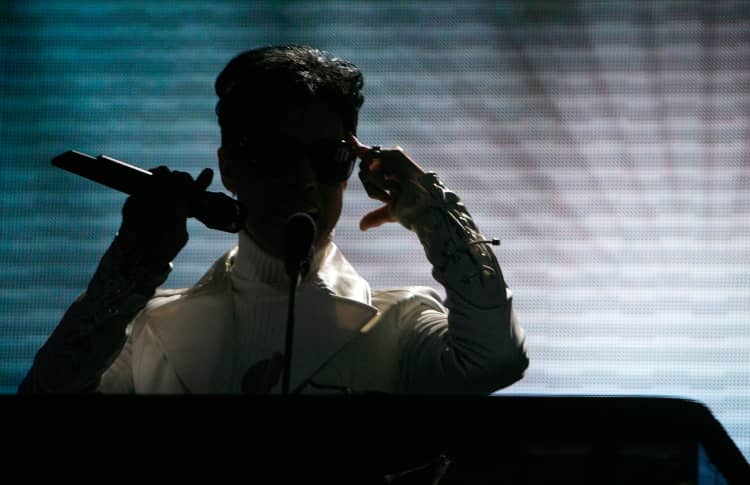How Prince Grieved
What Prince’s 1982 gem “How Come U Don’t Call Me” can teach us about the moments when we feel alone.

It’s one last trick of Prince’s genius that, after 40-plus albums recorded over 37 years, he seems to have left us with too little too soon. But there is one song that now seems designed for this emotional fallout, a song that might guide his fans through just this grief. “How Come U Don’t Call Me Anymore” was released in 1982 as the B-side to 1999. Tucked behind that manic pre-apocalyptic party, it occupies another kind of aftermath: the moment when you realize that you’re on your own.
“How Come” is unusual in its simplicity; it features just Prince, his acoustic piano, two quick verses, and a bridge. But it combines so many facets of his brilliance: the high drama, the quirky-cool camp, the immodest virtuosity. That virtuosity makes the song less about grief per se than about the art of grieving. The pain is real, but it is laced with dark blues humor and lit with the stubborn glow of care.
Prince starts the one-sided affair with a lovely attack on the keys. If the spare arrangement reflects his solitude, the way he is miked extends the solitude to his whole body—from his echoic falsetto to his steady thumping foot. That foot keeps the 6/8 time for the song’s duration:
I keep your picture beside my bed,
And I still remember everything you said.
I always thought our love was so right,
I guess I was wrong.
Always thought you’d be by my side, mama,
Now you’re gone.
One verse in and things aren’t so bad. The picture of his lover’s face still there, the words committed to memory. Maybe she’s not as “gone” as she seems. And here comes the turnaround, which might be promising:
What do I know baby?
What we had was good.
How come you don’t call me anymore?
It doesn’t take long for the song’s crisis to sink in: she’s not going to call to tell him why she doesn’t call. Things start to get real when, after the conversational tidbit that he still likes a fire on a rainy night, Prince scrapes through his throat the fact that he stiiiiiill likes it better when you’re holding me tight! He sings that “still” a fifth higher, stretching and straining with the infuriating endurance of desire. Here too is the healthy ego in a state of indignant denial—you just cannot believe someone has left you. In light of the musical prowess Prince displays, the lover’s mistake seems self-evident.
This song was used to score another scene of jilted love in Spike Lee’s 1996 film Girl 6. In that movie, a beautiful phone sex operator, played by Theresa Randle, awaits a caller-turned-love interest at the appointed place, on Coney Island. But the man never arrives, and the image of Randle alone on the Ferris wheel and amusement park bench is flamboyantly sad. Which is to say, it’s almost funny.
As James Baldwin reminded us in his 1964 essay “The Uses of the Blues”: “There’s always something a little funny in all our disasters, if one can face the disaster.” What Baldwin calls “this passionate detachment, this inwardness coupled with outwardness,” with which one looks heartache in the eye and says, “Good morning,” as Billie Holiday did, defines the blues sensibility. That sensibility shapes every part of Prince’s “How Come U Don’t Call Me” performance, from his cheeky asides—everyone said “we looked kinda cute together”—to his pivots between real grief, mock tantrums, and hangdog swag.
Through this song, Prince insists on the freedom to mourn however he sees fit—and to keep mourning, even as it fades out to its close. When the song’s bridge leads nowhere, it doesn’t matter—the point is not relief but the artful expression of a grief with no foreseeable end. What matters is how the lyric breaks down and Prince sends up the word “please” like a flare into the night. This man, like James Brown, is not afraid to beg. And he makes it sound so beautiful.
“How Come U Don’t Call Me” doesn’t tell a story—it just asks a question. So the lover’s absence is a mystery, as mystifying as Prince’s own sudden death. Is he really gone? No more music? What about the in-progress memoirs? No more shows? There’s no use in pretending it doesn’t hurt. But when Prince plays with timbre and timing, bending to the point of breaking, without breaking, it must also be said that the grieving feels good. The thing is, you need the right accompaniment: Prince’s jarring piano, his stomping foot, the echoes of his own voice that join in the refrain as if keeping him company. He is bereft in his grief, but he isn’t alone. And the only solace is that we aren’t either.




